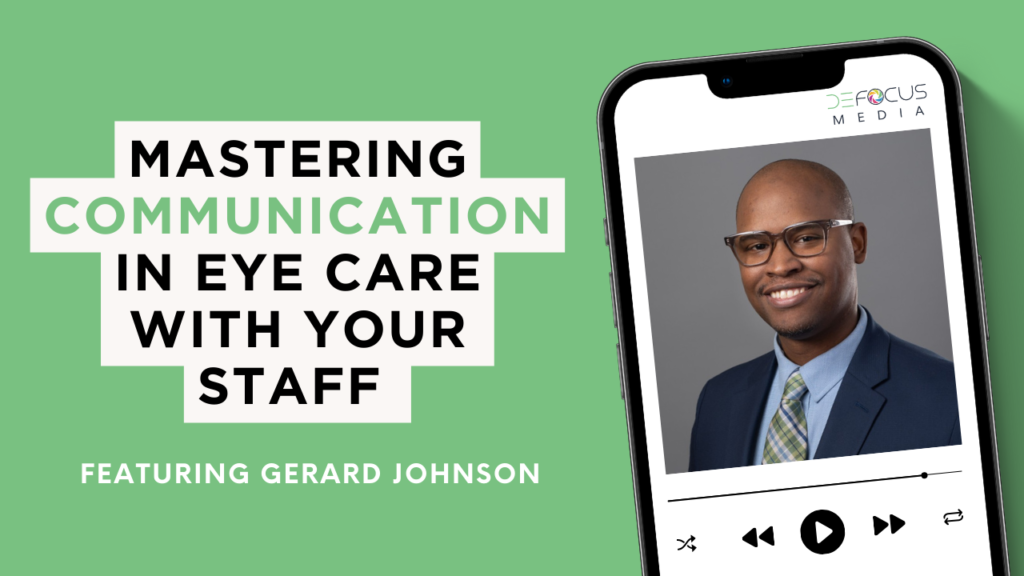Podcast: Play in new window | Download | Embed
Subscribe: Apple Podcasts | Spotify | Amazon Music | Android | RSS
Are you ready to revolutionize your healthcare practice, mastering communication in your eye care practice, and elevate your leadership skills? In this episode of Defocus Media, Optometry’s #1 podcast network, Dr. Darryl Glover sits down with Gerard Johnson, a seasoned healthcare manager with 15 years of experience in the industry.
Gerard shares invaluable insights on mastering effective communication in your eye care practice, the pitfalls of micromanagement, and the impact of gossip in the workplace. He also delves into the critical importance of clearly defined roles and responsibilities and the devastating effects of miscommunication in healthcare practice.
Whether you’re a budding manager or a seasoned professional, Gerard’s practical advice and real-world examples will empower you to create a more cohesive, efficient, and positive work environment. Tune in to discover how to lead confidently, delegate effectively, and foster a culture of growth and collaboration in your practice. Don’t miss this opportunity to learn from one of the best in the field and take your leadership skills to the next level!

What’s Covered?
Communication in Eye Care
Dr. Darryl Glover: Do you want to take managing your practice to the next level? How do you handle microaggressions? How do you handle conflict? How do you handle communicating with your team so that they give your patients the best care and the best experience ever? Today, on Defocus Media, Optometry’s #1 podcast network, we have the one and only Gerard Johnson.
Dr. Darryl Glover: I’d love for all my listeners and colleagues out there to learn a little more about you. So, if you don’t mind, maybe tell us about your background and how you got into the wonderful world of eye care.
Gerard Johnson: Sure. I’ve been in healthcare management for about 15 years now. I’ve managed everything from small startup practices, like we did with Southpoint years ago, to bringing new practices to new markets, such as Atlanta. I’ve worked as a multi-unit contact lens manager here in Atlanta. I was an ABO and NCLE-certified contact lens optician. So, a little bit of everything. Now, I’ve moved into a different area of healthcare with primary care and urgent care.
I’ve done a bit worldwide, including opening flu vaccine clinics and COVID vaccination clinics when those vaccines first became available. I enjoy healthcare and helping people. Most importantly, I love growing people. That’s why I got into this—to grow people.
Dr. Darryl Glover: Let’s start with the basics of communication regarding how you got to where you are and how our colleagues can do better in any healthcare setting.
Gerard Johnson: The first thing I learned, way back when I first started in leadership, was during a management class. The first thing they taught us was, it’s not what you say, it’s what the other person hears.
Dr. Darryl Glover: Oh, say that again, man. Drop that gem! That was a heavy one, right?
Gerard Johnson: You could have the best intentions in what you say, but that doesn’t mean the other person understands it that way. Being mindful and calculated, having these conversations with yourself before you talk to the other person allows you to be clear and confident in communicating with them. Before you go into a situation where you need to communicate something, I would often sit in my office and play through that conversation. Role-playing with myself.
Dr. Darryl Glover: Is that why I always heard someone talking to themselves in the other room? I thought you might have gone a little, you know, cuckoo at times.
Gerard Johnson: I was going through situations and role-playing the conversations. This is something I want to talk about in high schools. Sometimes, people ask me, “You seem very confident. How is that?” It’s because I had these conversations before I had them.
Dr. Darryl Glover: Yeah, I love that. Especially when you’re having a conversation that’s not very comfortable, right? Take your time. You don’t have to rush into it. Just because you know you need to have the conversation doesn’t mean you should run into it unprepared. Take your time. Go through the pros and cons. What’s the worst-case scenario? What will that doctor say when you tell them they need to speed up a bit? What’s going to be their response? You’ve probably heard it before, so you know what’s coming. Are you prepared for that conversation?
Gerard Johnson: Exactly. Are you prepared to be honest and have those conversations with yourself? I would walk around and talk to myself like a crazy person in my office. For some people, it might help to write it down. Putting pen to paper removes those emotions and makes you pause to think about what you’re saying and writing. Therefore, when you go into that communication, you’re prepared. One of the things I use to prevent micromanaging is what I call my “ROLEs.” Whenever I’m going into a conversation or giving someone a new responsibility, I have a little spreadsheet called ROLE.
Navigating Microaggressions and Overcoming Micromanagement
Dr. Darryl Glover: Okay, let’s break that down. Let’s jump into microaggressions because it’s a buzzword in today’s society.
Gerard Johnson: Sure. In my case, I was very fortunate to have a very forthright employee. I was new, young, and full of vinegar, trying to do my best. I was doing too much. Often with managers, our insecurities lead us to do too much. We’re always at the front desk, saying, “Let me do that. Let me do this,” when sometimes you just have to sit back. Not necessarily relax, but give your team space. They know what they’re doing. If they don’t, that’s when you take the time to communicate with them. You can’t be overbearing and domineering.
The general consensus for the definition of micromanagement is a top-down level of domineering management where every decision, even the simplest one, goes through you. The problem with that is it stagnates your team, leading to turnover. Your team feels stifled. They don’t feel like they’re learning or growing, so they leave. They either grow within your practice or go somewhere else to grow. You’ll also slow down your efficiency. If every time someone needs to make a simple decision, like which copy paper to order, they’re wasting time waiting for you to make that decision. Be willing to delegate tasks that can be delegated.
Another component is ego. As a leader, ego often gets in the way. You see micromanagers acting out because they’re afraid to lose control. They’re confident in their abilities to manage what’s happening, so they have to be the voice. They block out all competing ideas because they fear they aren’t good enough. You’ll even see it in the way they train people. Sometimes you’ll hear a manager say, “I don’t want them to get their ABO certification because what if they leave?”
Dr. Darryl Glover: I love it, man. I want to take a step back. We’ve been talking about microaggressions, and you mentioned in this article the common behaviors of micromanagers. I want to list a few so that folks can see them in themselves and may want to change or maybe partner with you to consult and learn how to change these behaviors.
- Some behaviors include scrutinizing every action
- Always pushing back deadlines
- Excessively requesting updates
- Never being entirely satisfied with others’ work
- Disputing insignificant details
- Fighting against decision-making autonomy
- Taking pride in correcting others’ mistakes
- Having a “my way or the highway” view.
The Role of Gossip in Workplace Dynamics
Number one is gossip. Number two is ambiguity of roles and responsibilities. Number three is miscommunication. You touched on miscommunication earlier, but I’d like to spend a little time on each of these topics. Let’s start with number one, gossip, because I feel like gossip can kill an office. Gossip can kill your bottom line and drive a doctor insane. So let’s talk about that. How do you manage that?
Gerard Johnson: The first way to manage gossip is to understand that you’re not going to completely eliminate it. Studies show that 90 percent of all employees gossip. It’s going to happen, right? You can tell them not to do it, and they’ll agree, but then they’ll go back and spread gossip anyway. It’s about controlling the gossip. Gossip isn’t necessarily a bad thing; there can be positive gossip. For example, once I was opening a large practice in Atlanta and taking over a practice that wasn’t open on Saturdays. In optometry, Saturdays are money days. People have the day off, they just got paid on Friday, and they’re willing to spend time and money to get their eyes checked.
In that situation, I knew the change was coming, so I started spreading the gossip early. I hinted, “Hey, just something to be mindful of. We might be open on Saturdays soon.” This spread the idea around. Staff members began discussing it among themselves, coming to grips with it, and making decisions. So, when I officially announced, “In two months, we’re going to open on Saturdays,” no one was shocked. They had already heard the gossip and were prepared for the change.
Dr. Darryl Glover: I like that, man. You put a positive spin on gossip.
Clarifying Roles and Responsibilities to Prevent Conflict
Dr. Darryl Glover: All right, let’s transition to conflict, particularly about roles and responsibilities. When people are a little lost about what they’re supposed to do, how do you handle that?
Gerard Johnson: A lot of times, conflicts arise because two people have a task, and they don’t know who’s responsible for what. This goes back to what I talked about before—utilizing that role spreadsheet. Everyone is fully aware of not only their responsibilities but also how their roles impact others downstream. By communicating how each person fits into the larger purpose of the practice, everyone understands their part in the practice’s success.
So, when a mistake happens, no one points fingers. They understand their expectations for the process and where the breakdown occurred, allowing us to communicate about those breakdowns and address the friction. Also, some people don’t want to take responsibility for the parts they didn’t complete. That’s where conflict arises, with everyone pointing fingers at each other. But if everyone knows and agrees on their responsibilities and the team’s expectations, you eliminate many of those conflicts and the associated friction.
Tackling Miscommunication for Improved Efficiency
Dr. Darryl Glover: Got it. And this is also where you can incorporate the ROLE method as well. I love the overlap. Let’s take it home with miscommunication, conflict number three. I know we touched on this briefly, but I want to spend a few minutes getting into the weeds because miscommunication can set you up for complete failure. I want all my colleagues out there to thrive and communicate effectively in their practice. So let’s talk about miscommunication, Gerard.
Gerard Johnson: Many times, especially in my experience working with doctors, they’ve learned their craft, what they went to school for, but they didn’t necessarily learn how to communicate their needs to their staff. This leads to miscommunication where the doctor believes they communicated effectively. This goes back to what we talked about earlier: it’s not what you said; it’s what the other person heard. The doctor thinks they’ve communicated how they want something done, but the team member might not understand it that way.
Gerard Johnson: As a doctor, you need to be patient and communicate exactly what you need done. If you need steps A, B, and C done, ask that person to explain it back to you. Approach them with understanding and assume the best. Ask them why they thought their method was the best way to do it and give them the opportunity to explain. Don’t fill in the blanks—listen to them. Often, we talk to hear ourselves and then wait for our turn to jump in instead of truly listening. It’s like double dutch, right?
Gerard Johnson: Right. In the health system I work with now, we teach a class called Safety First. It’s about how communication can prevent harm to patients and how smiling at a patient can make them more comfortable, encouraging them to share more information. When you’re double-checking a diagnosis, you’re telling them and then waiting, giving their brain time to process and ask questions.
Gerard Johnson: Miscommunication often happens because we’re not waiting to listen to the answer and not adjusting to the feedback we receive. We might know how we want something done, but if someone tells you they can’t do it that way, you need to listen to them, understand their perspective, and make adjustments based on what they’ve told you.


